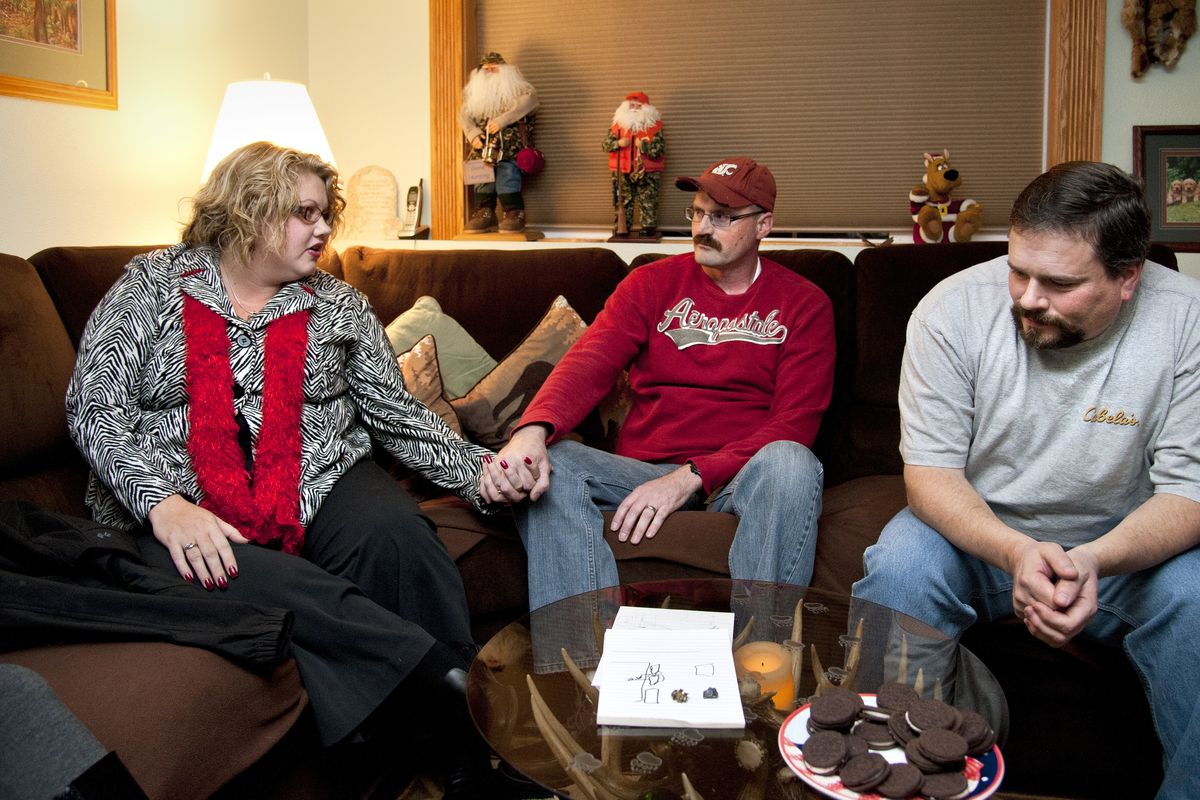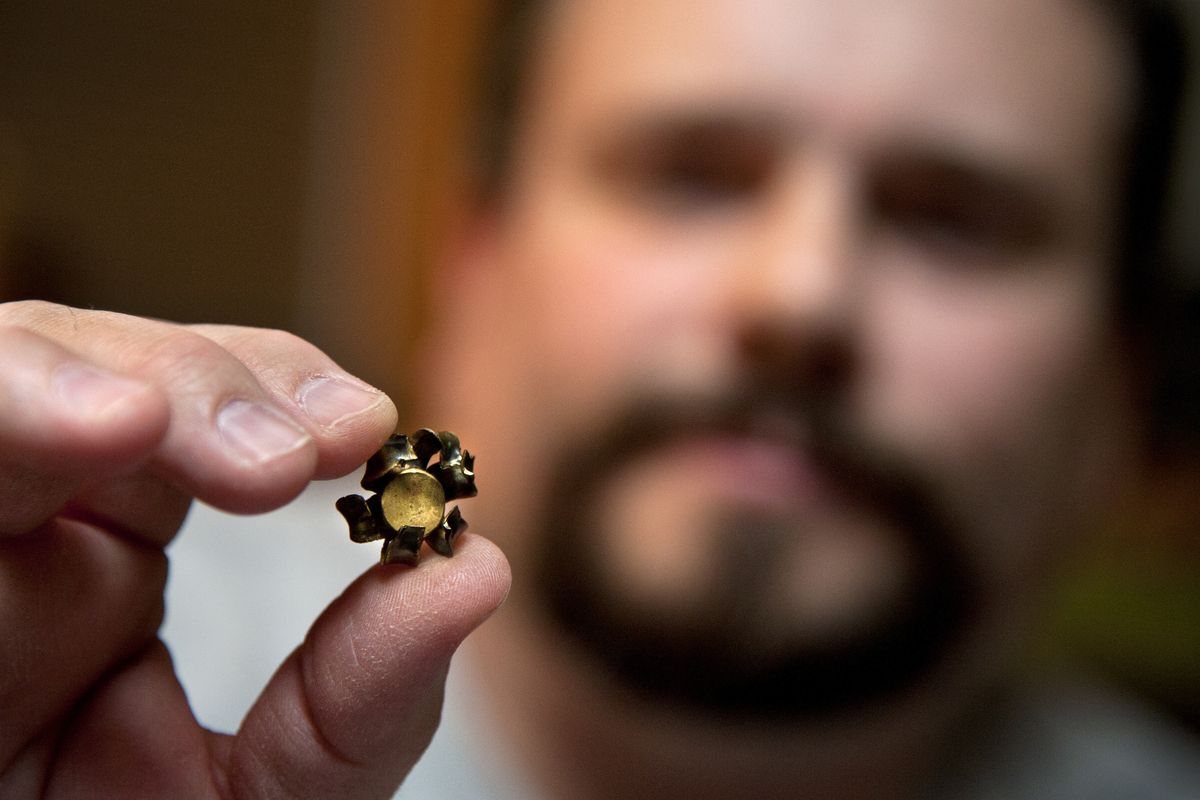‘He got out of that car to kill us’
On June 19, deputies became engaged in gunbattle after pulling over federal fugitive
Spokane County sheriff’s Deputy Matt Spink displays the bullet jacket that was removed from his leg after he was shot by federal fugitive Charles Wallace on June 19 in Spokane. The bullet was also lodged in – and removed from – his leg. (Dan Pelle)Buy a print of this photo
Spokane County sheriff’s Deputy Mike Northway flipped on his blue lights and the Chevy Tahoe pulled over.
Northway parked his cruiser behind the SUV on East Elm Street just off U.S. Highway 2 in north Spokane; Deputy Matt Spink pulled in behind him.
Detectives with the regional drug task force had asked the deputies to stop the Tahoe on June 19 because they thought the people inside might know where to find Charles Wallace, a dangerous federal fugitive.
Instead, as Northway and Spink started to approach the vehicle, the passenger door flew open and a man with a .40-caliber handgun said, “Let’s go, boys.”
Then he started shooting.
“Before I knew it, I was hit,” Spink said. “He got out of that car to kill us.”
Wallace fired nine times at the deputies; five bullets found their mark.
Spink responded with six shots; Northway, four.
Neither deputy remembers drawing his gun.
Spink was hit in the upper thigh and quickly lost blood.
Northway was struck four times, once in each limb. Yet he fired until Wallace ran out of view. “At that time, I was fighting for my life,” Northway said in the deputies’ first public interview about the shooting.
Within seconds, Spink radioed for medics. “There was a pause,” he said. “They asked me for what. I told them we’d both been shot.”
When there was a lull in the shooting, Spink took cover to reload his gun. As he held the clip in his left hand and the gun in his right, his hands seemed to fall away from him. He felt powerless.
“It’s the shittiest feeling in the world. I’m in the middle of a gunfight, and I can’t load my gun,” said Spink, who looked down to see blood overflowing from his boot. “I was getting so tired.” He realized later he was passing out.
“At this point, I haven’t really looked at Mike,” said Spink, who heard the Tahoe take off.
Wallace had fled on foot.
The shooting was over in less than 30 seconds. Northway lay on the ground, his body propped against the curb. One bullet had shattered his femur; another severed an artery in his left arm.
For a moment he thought he might die.
And then a woman who lived nearby, Tomi Wheeler, rushed to help.
“I remember seeing blond hair hanging over me,” Northway said. “She didn’t hesitate. She was feeling around for injuries. The blood didn’t bother her at all.”
Hearing her voice was a relief, Spink said, just knowing someone was there to help.
“I was just concentrating on taking that next breath. It was very hard to breathe.”
Meanwhile, officers who had listened to the event unfold on their radios raced to the scene as one of the most intensive local manhunts and car chases in recent memory unfolded.
Tami Spitzer, a sheriff’s detective and a good friend of Spink, drove to the workplace of his wife, Diane.
Deputy Tom Edelbrock, en route to the scene, saw an ambulance on U.S. 2 and radioed to turn it around. Three other sheriff’s office employees just happened to be in the area and converged on the bloody scene.
Wallace, the shooter, had been indicted on federal heroin charges. Released from jail to court-ordered rehab, he’d escaped and the drug task force had been searching for him for about a week.
Detectives didn’t know he was in the Tahoe because he was wearing a disguise, a wig sewn into a baseball cap.
“If we had known Wallace was in the car, they (the deputies) wouldn’t have been shot that day. We wouldn’t have had them stop the vehicle,” said Shawn Hausey, a sheriff’s deputy assigned to the regional drug task force. “We’d heard from several different sources that he was going to shoot it out with the cops because he didn’t want to go back to prison.”
Deputies knew how dangerous Wallace was
On that late-spring day, Northway and Spink had separately spoken with their colleagues about how dangerous Wallace was. The suspected heroin trafficker was facing his fourth prison term before he escaped from rehab, and his long criminal history – at least 15 felony convictions – included third-degree assault and eluding police.
“We got word that he’d walked away from there, and we didn’t even know he’d been released (to rehab),” Hausey said. “We couldn’t believe he had.”
Northway, who grew up in Deer Park, joined the Spokane County Sheriff’s Office in 1996. The 42-year-old has a bachelor’s degree in criminal justice from Eastern Washington University.
Spink, 45, was raised near Philadelphia, joined the Air Force right after high school, and had worked in group homes and in the sheet metal industry before joining the sheriff’s office in 1999. He has bachelor’s and master’s degrees in criminal justice and says of his profession, “It’s very seldom that it’s rewarding, but when it is, it’s huge.”
The two deputies spent the last four years patrolling neighboring districts in north Spokane, often pairing up to assist each other.
Although their training taught them how to respond to a shooting, they said nothing can prepare a person for the reality of being shot.
“You train. You run the scenarios through your head,” Spink said. But, “you don’t picture yourself. You don’t picture your buddies.”
You don’t think about someone trying to kill you, he added. If you did, “it would change how you do your job.”
Their phones were ringing continuously
When medics and firefighters reached Northway and Spink, Northway asked for oxygen. Spink asked for water.
As the deputies were rushed to Providence Sacred Heart Medical Center, medics talked to them, reassured them. They were going to be all right.
“Hearing you are going to be all right … it means so much,” Northway said.
The experience brought home to the deputies how important words can be in comforting people in a crisis. They’d never been on the other side.
As the news of the shooting spread, people frantically tried to call the deputies.
Spink’s cellphone was “ringing off the hook” as he lay on an ambulance gurney, Spink said. Northway, shot in both arms, could only listen to the buzzing of his phone, set to vibrate.
Detective Spitzer, meanwhile, reached Spink’s wife.
“As soon as I saw Tami, I knew something was wrong,” Diane Spink said.
Spitzer said, “It was the hardest thing I’ve ever had to do, because you can’t lie to them. I just hugged her and said, ‘Matt’s been shot. I don’t know how bad.’ I just knew I had to get her there so she could be by his side.”
Northway’s wife, Katie, was at home with the couple’s two young children. Her sister-in-law called and told her to turn on the news.
She called one of their friends, a Washington State Patrol officer. “He said, ‘Are you at home? I’m coming to get you right now.’ ”
She hung up, then, seeing her children at her feet, wondered who’d watch them. Just then, their friend called back: “I’m bringing my sergeant. He’s going to watch the kids.”
Meanwhile, Wallace had led police on a 21-mile chase before crashing into a patrol car and killing himself.
‘I’m still angry’
After Northway was released from the hospital’s intensive care unit, he was put in a room next to Spink. Deputies were stationed outside the rooms for their protection.
“That was comforting,” Spink said.
Katie Northway added, “I was worried about who else might be targeting them.”
Spink was released after four days. Northway spent nine days at Sacred Heart and another seven days at St. Luke’s Rehabilitation Institute.
The men were humbled by the support from the community, family and law enforcement. Friends delivered extra freezers to each of them to hold the food people made them.
Cash donations came in from all over the United States.
“It’s such a negative thing to occur,” Northway said, but the aftermath “turned it into a positive.”
The six-month anniversary of the shooting passed earlier this month, and Spink and Northway still have a lot of recovery ahead of them.
Surgeons didn’t remove the bullet from Spink’s leg until September. He keeps the .40-caliber bullet and shell casing in a Ziploc bag.
“My leg is slowly coming back,” he said.
Northway’s physical therapist, Jim Strandy, said his patient is gaining, considering the extent of his injuries.
“The worst injury was to a nerve in his left arm, right above the elbow, which operates the thumb muscles, the index finger and the long finger. So he has a fairly numb hand,” Strandy said. “But he is recovering. It may be another six months, maybe a year, before it’s fully recovered.”
The deputies’ recovery, however, is more than physical.
“I see a psychologist once a week,” Spink said. “Someone tried to kill me because I was in a sheriff’s uniform doing my job.”
Mary Dietzen, a psychologist, counsels both men. She’s been working with law enforcement for close to 20 years. She couldn’t speak specifically about her patients, but she talked in general about how an officer might respond to a traumatic event.
“Even though they are trained to use a gun and put their lives in jeopardy, they are human … those things that are meaningful to the rest of us are meaningful to them,” Dietzen said. Most experience nightmares, flashbacks, insomnia, concentration problems, emotional detachment and depression, she said. “Someone experiencing PTSD, they respond with helplessness and extreme fear, and police officers are trained not to respond with fear and helplessness.”
Over time, how officers have dealt with their trauma has changed. “Years ago, you didn’t talk about it,” Dietzen said. “It was a sign of weakness,” but now most officers seek help and most of them return to work.
When the officer goes back depends on the individual. “I see some four to six times, and they go back; some are four to six weeks, some are three months, some are six months, and some don’t go back at all,” Dietzen said. “In my experience, over 90 percent go back.”
She added, “Physically and psychologically they are never going to be the same. They need to tell their story, but I don’t push them. Our job is to educate them, help them to know that this is normal and give them coping mechanisms.”
Northway says his goal is to go back to work eventually, “but there are no certainties.”
Spink isn’t ready to answer the question about whether he’ll go back to work. He says the recovery process has been likened to the stages of grief, which starts with denial, followed by anger.
“I’m still angry,” he said.
Spitzer, who has worked with Spink his entire career at the Spokane County Sheriff’s Office, said, “This type of job, you don’t do this for the money or to drive cars fast. You do it because it’s meaningful to you, and to have that taken away, I’d be mad too.”


